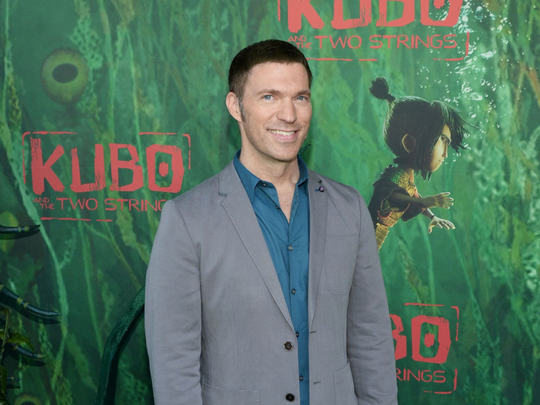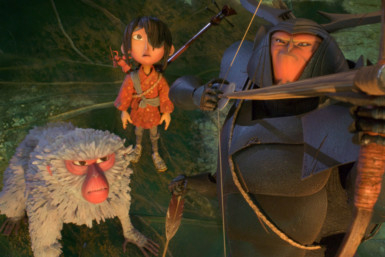
Early in life, Travis Knight received two especially treasured gifts from his parents. One came to him, and the other required travelling far.
When she was pregnant with Travis, Knight’s mother, Penny — a lover of epic fantasy adventure — would read Lord of the Rings. Knight believes that imbued him with a love of the genre. “It was,” he says, “a beautiful gift.”
And when Travis was about eight, the boy — who had travelled little beyond his native Oregon — journeyed with his father, Nike founder Phil Knight, on a business trip to Japan. The son immediately fell in love. “From the moment I was there,” he recounts, “it was like I had been transported to another world. It was so beautiful and breathtaking and otherworldly, and so unlike anything I’d experienced before.
“From the art and the architecture to the food to the style of dress to the music and movies and comic books — it was something of a revelation,” Travis Knight says. “It was the beginning of my lifelong love affair with the culture.”
On Friday, Knight released his directorial feature-film debut, Kubo and the Two Strings, a stop-motion animated fantasy sprung from a Japanese folk tale. The film, I believe, is itself beautiful and breathtaking and otherworldly — and in certain moments, visually, it is so unlike anything I’ve experienced on screen before.
Kubo, a boy storyteller turned questing samurai warrior, looks about the same age that Travis Knight was when he first went to Japan. In the beginning, Kubo spends much of his time with his ailing mother secreted away from evil sisters in a dark, womblike cave. Mother and child warm themselves over the flame of passed-down oral lore.
Yet when supernatural forces threaten Kubo (voiced by Art Parkinson), he must launch into a hero’s journey led by parental-type creatures Monkey and Beetle (voiced by Oscar-winners Charlize Theron and Matthew McConaughey). There is a trip across a perilous sea, but revelation awaits on the shore.
Kubo is a richly textured fantasy adventure lovingly stitched together by entire teams of people. Yet it is easy to look at Kubo’s tale of personal growth within his powers — as both paper storyteller and leader — and see the reflected glint of Knight’s own rise.
Like most kids, Knight says, he loved animation. But unlike most kids, he notes, he soon wanted to become an animator.
“You go try to do it in your parents’ basement or garage — there were really no schools back then to teach,” stop-motion, says Knight, of his ‘70s and early-’80s childhood. “It really was just trial and error. I’m envious of kids nowadays, because the internet exists as a tremendous resource.”
Knight grew up in the Portland area, where his father cofounded the multibillion-dollar sports-gear behemoth, which officially became Nike about two years before Travis was born in 1973.
Knight attended Portland State University, and though he had interest in making rap tunes (briefly going by the moniker Chilly Tee), he steered toward a career in cartoons. He had grown up loving creature features — the style of animation in such films as Jason and the Argonauts, masterminded by stop-motion pioneer Ray Harryhausen.
“If any single human being is responsible for all this nonsense I’ve done with my life,” Knight says, “it’s Ray Harryhausen. ... In Kubo, you can see some of his influence throughout.”
In the ’90s, Knight became a production assistant and then an animator on the Emmy-winning ’90s clay stop-motion show The PJs, co-created by Eddie Murphy and Larry Wilmore, and animated by Will Vinton Studios. Besides that series and UPN’s Gary and Mike, Knight undertook commercial work, labouring under tight deadlines in a wide variety of aesthetics — “bouncing from stage to computer lab, the process of each [ad] so completely different.”
Then more than a decade ago, Phil Knight founded the Oregon stop-motion studio Laika as a successor to the Will Vinton shop (in which Phil had previously invested). Henry Selick was aboard, directing the new studio’s first animated short, 2005’s Moongirl. (The film was dedicated to the memory of Travis Knight’s brother, Matthew, who died of a heart attack a year earlier while diving.)
And then came Coraline.
Adapted from the Neil Gaiman story, it became the studio’s first stop-motion feature film. “We had a beautiful novel written by a master, and a team of world-class artists,” says Knight, who was lead animator on the film, and who is now chief executive of Laika.
Still, he notes, the project was rejected by every major and semi-major production company they approached, until finally Focus Features “got” the Laika vision. One company, Knight says, even told them: “You can’t have a female protagonist in an animated film — unless she’s a princess.”
The movie, which follows a young girl who travels through a portal of alternate parentage, was released in 2009 to commercial success and critical acclaim, garnering an Oscar nomination. Laika followed that up with another supernatural hit, ParaNorman.
Besides being an artist, Knight says he has evolved into his role of being the boss. And some of the most meaningful advice came out of a conversation with director John Stevenson (Kung Fu Panda).
“He gave me something of a pep talk,” Knight recounts.” “He said: ‘A place needs a visionary. It needs a point of view. It needs an identity. And it has to be you. You have to do it!’
“That changed everything for me, and changed the shape of what Laika became.”
Over a Scottish meal about five years ago, in a dimly lit L.A. eatery, writer Shannon Tindle pitched Knight on a few ideas. “One of them stuck to my ribs even more than the haggis,” Knight recounts. It was the raw idea for a Japanese folk tale.
Laika had never taken on a fantasy epic. Kubo struck a chord with Knight and the childhood gifts of story and setting his parents had given him. “Kubo,” he says, “was this convergence of fantasy and art and animation, combined with the transcendence of Japan, all bound together by the sustaining love of family.”
Kubo gives us maternal and paternal figures, guiding our young storytelling hero to the maturation that a difficult but successful quest brings.
So as a viewer watches this gorgeous film, a natural subtitle comes to mind, given the director’s personal back story:
“Travis and the Two Loving Parents.”
Don’t miss it
Kubo and the Two Strings releases in the UAE on September 1.














